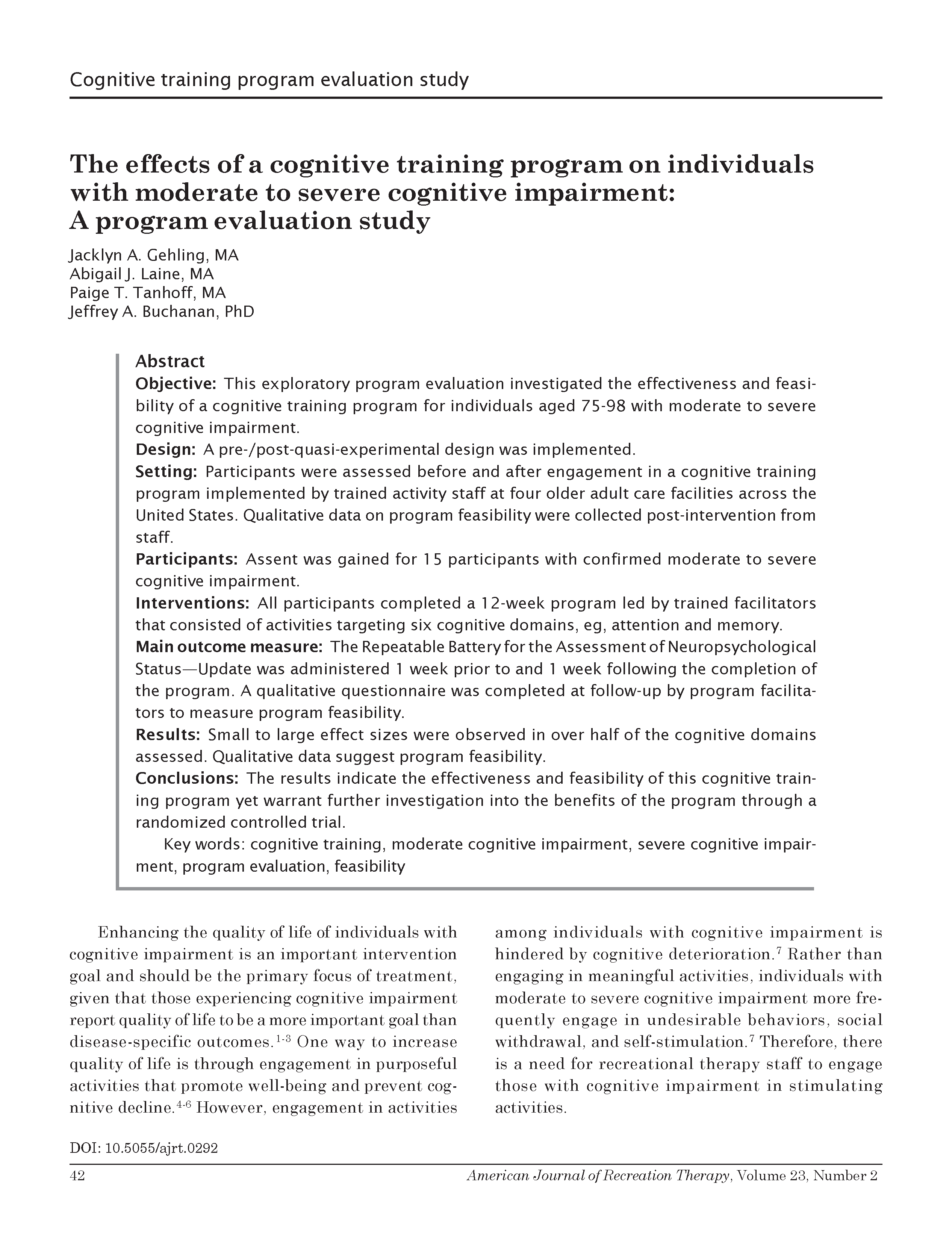The effects of a cognitive training program on individuals with moderate to severe cognitive impairment: A program evaluation study
DOI:
https://doi.org/10.5055/ajrt.0292Keywords:
cognitive training, moderate cognitive impairment, severe cognitive impairment, program evaluation, feasibilityAbstract
Objective: This exploratory program evaluation investigated the effectiveness and feasibility of a cognitive training program for individuals aged 75-98 with moderate to severe cognitive impairment.
Design: A pre-/post-quasi-experimental design was implemented.
Setting: Participants were assessed before and after engagement in a cognitive training program implemented by trained activity staff at four older adult care facilities across the United States. Qualitative data on program feasibility were collected post-intervention from staff.
Participants: Assent was gained for 15 participants with confirmed moderate to severe cognitive impairment.
Interventions: All participants completed a 12-week program led by trained facilitators that consisted of activities targeting six cognitive domains, eg, attention and memory.
Main outcome measure: The Repeatable Battery for the Assessment of Neuropsychological Status—Update was administered 1 week prior to and 1 week following the completion of the program. A qualitative questionnaire was completed at follow-up by program facilitators to measure program feasibility.
Results: Small to large effect sizes were observed in over half of the cognitive domains assessed. Qualitative data suggest program feasibility.
Conclusions: The results indicate the effectiveness and feasibility of this cognitive training program yet warrant further investigation into the benefits of the program through a randomized controlled trial.
References
Cooper C, Mukadam N, Katona C, et al.: Systematic review of the effectiveness of non-pharmacological interventions to improve the quality of life of people with dementia. Int Psychogeriatr. 2012; 24(6): 856-870. DOI: 10.1017/S1041610211002614.
Moyle W, Mcallister M, Venturato L, et al.: Quality of life and dementia: The voice of the person with dementia. Dementia. 2007; 6(2): 175-191. DOI: 10.1177/1471301207080362.
Whitehouse PJ, Rabins PV: Quality of life and dementia. Alzheimer Dis Assoc Disord. 1992; 6(3): 135-137. DOI: 10.1097/00002093-199206030-00001.
Smit D, de Lange J, Willemse B, et al.: Activity involvement and quality of life of people at different stages of dementia in long-term care facilities. Aging Ment Health. 2016; 20(1): 100-109. DOI: 10.1080/13607863.2015.1049116.
Cohen-Mansfield J, Dakheel-Ali M, Jensen B, et al.: An analysis of the relationships among engagement, agitated behavior, and affect in nursing home residents with dementia. Int Psychogeriatr. 2012; 24(5): 742-752. DOI: 10.1017/S1041610211002535.
Ghisletta P, Bickel JF, Lovden M: Does activity engagement protect against cognitive decline in old age? Methodological and analytical considerations. J Gerontol B Psychol Sci Soc Sci. 2006; 61(5): P253-P261. DOI: 10.1093/geronb/61.5.p253.
Chung J: Activity participation and well-being of people with dementia in long-term-care settings. Occup Ther J Res. 2004; 24(1): 22-31. DOI: 10.1177/153944920402400104.
Kallio EL, Ohman H, Kautiainen H, et al.: Cognitive training interventions for patients with Alzheimer’s disease: A systematic review. J Alzheimers Dis. 2017; 56(4): 1349-1372. DOI: 10.3233/JAD-160810.
Bahar-Fuchs A, Clare L, Woods B: Cognitive training and cognitive rehabilitation for mild to moderate Alzheimer's disease and vascular dementia. Cochrane Database Syst Rev. 2013; 6(CD003260). DOI: 10.1002/14651858.CD003260.pub2.
Oyebode JR, Parveen S: Psychosocial interventions for people with dementia: An overview and commentary on recent developments. Dementia. 2019; 18(1): 8-35. DOI: 10.1177/1471301216656096.
Garrido-Pedrosa J, Sala I, Obradors N: Effectiveness of cognition-focused interventions in activities of daily living performance in people with dementia: A systematic review. Br J Occup Ther. 2017; 80(7): 397-408. DOI: 10.1177/0308022617698166.
Hopper T, Bourgeois M, Pimentel J, et al.: An evidence-based systematic review on cognitive interventions for individuals with dementia. Am J Speech Lang Pathol. 2013; 22(1): 126-145. DOI: 10.1044/1058-0360(2012/11-0137).
Olazarán J, Reisberg B, Clare L, et al.: Nonpharmacological therapies in Alzheimer’s disease: A systematic review of efficacy. Dement Geriatr Cogn Disord. 2010; 30(2): 161-178. DOI: 10.1159/000316119.
Mate-Kole C, Fellows RP, Said PC, et al.: Use of computer-assisted and interactive cognitive training programs with moderate to severely demented individuals: A preliminary study. Aging Ment Health. 2007; 11(5): 485-495. DOI: 10.1080/13607860701368422.
Buchanan JA, Johnson E, Kennedy J, et al.: The effects of a cognitive training program for cognitively impaired older adults: A pilot randomized control trial. Int J Aging Res. 2019; 2(2): 30. DOI: 10.28933/IJOAR.
Woods B, Thorgrimsen L, Spector A, et al.: Improved quality of life and cognitive stimulation therapy in dementia. Aging Ment Health. 2006; 10(3): 219-226. DOI: 10.1080/13607860500431652.
Teng EL, Chui HC: The modified mini-mental state (3MS) examination. J Clin Psychiatry. 1987; 48(8): 314-318.
New England Cognitive Center: Active MindTM. 2nd ed., text rev. New London, CT: New England Cognitive Center, Inc., 2015. Available at https://www.cognitivecenter.org/active-mind. Accessed July 26, 2024.
Randolph C: Repeatable Battery for the Assessment of Neuropsychological Status Update. New York, NY: Psychological Corp, 2012.
Holden HM, Milano NJ, Horner MD: Five-factor structure of the RBANS is supported in an Alzheimer’s disease sample: Implications for validation of neuropsychological assessment instruments. Appl Neuropsychol Adult. 2018; 27: 232-242. DOI: 10.1080/23279095.2018.1529671.
Nguyen L, Murphy K, Andrews G: A game a day keeps cognitive decline away? A systematic review and meta-analysis of commercially available brain training programs in healthy and cognitively impaired older adults. Neuropsychol Rev. 2022; 32(3): 601-630. DOI: 10.1007/s11065-021-09515-2.
McDermott O, Charlesworth G, Hogervorst E, et al.: Psychosocial interventions for people with dementia: A synthesis of systematic reviews. Aging Ment Health. 2019; 23(4): 393-403. DOI: 10.1080/13607863.2017.1423031.
Woods B, Aguirre E, Spector AE, et al.: Cognitive stimulation to improve cognitive functioning in people with dementia. Cochrane Database Syst Rev. 2012; 2: CD005562. DOI: 10.1002/14651858.CD005562.pub2.
Allen J: Nursing Home Federal Requirements: Guidelines to Surveyors and Survey Protocols. 7th ed. New York: Springer, 2011.

Published
How to Cite
Issue
Section
License
Copyright 2000-2025, Weston Medical Publishing, LLC and American Journal of Recreation Therapy. All Rights Reserved.

